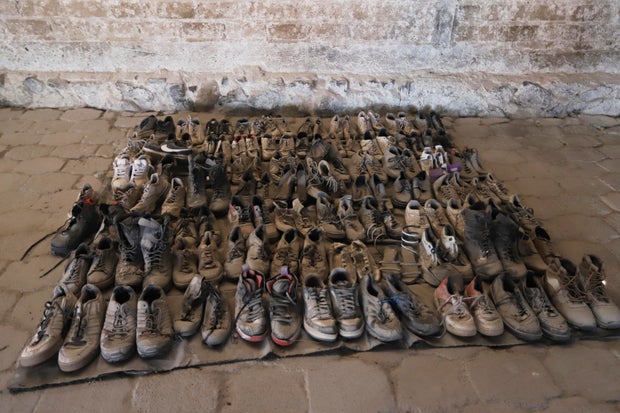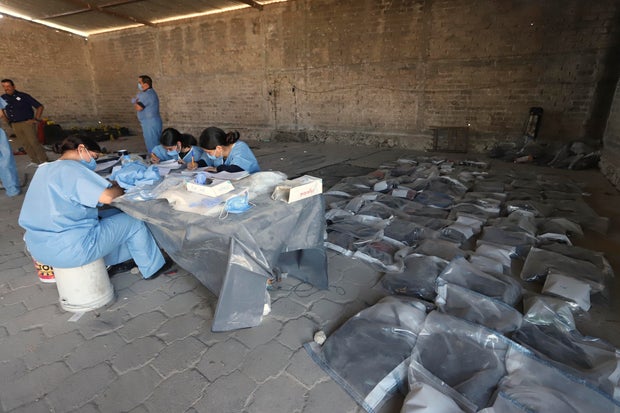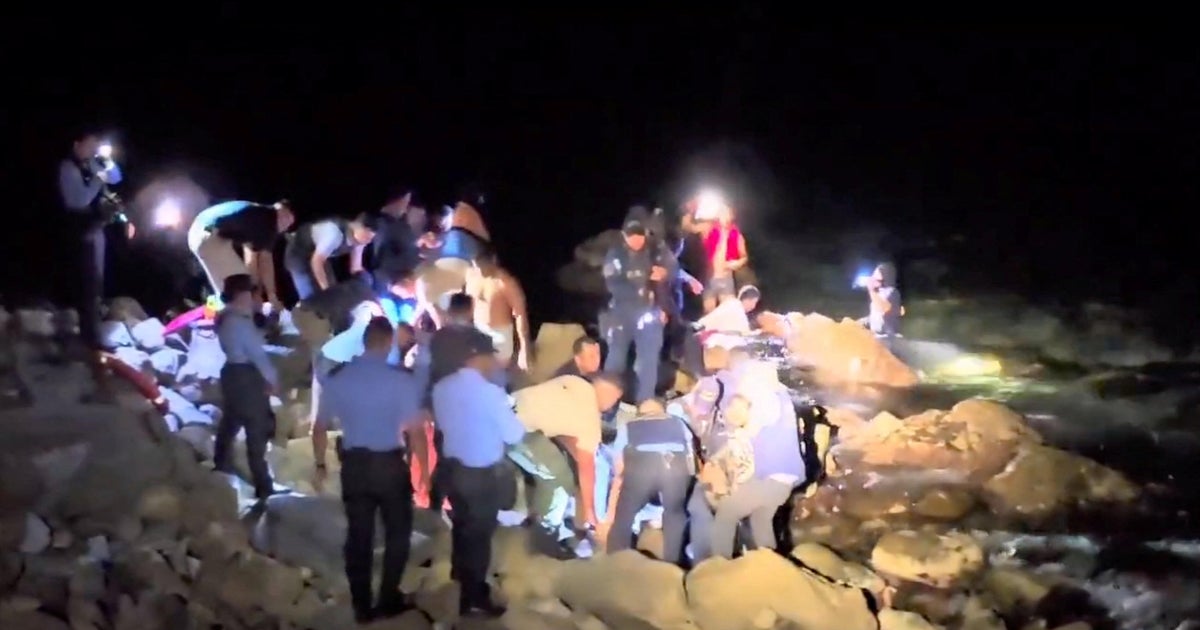How American guns make it to Mexico
When a group of citizens searching for missing relatives in the western state of Jalisco arrived at a remote ranch outside Mexico's second-largest city last week on an anonymous tip, all they had to do was push open the unlocked gate.
Inside they went to work with simple tools — picks, shovels and metal bars — doing the work that state investigators supposedly had done six months earlier.
What they found embarrassed state authorities and shook Mexico: dozens of shoes, heaps of clothing and what appeared to be human bone fragments. Distraught families from across the country have already started reaching out about clothing items they say they recognize.
 This photo released by the Jalisco State Attorney General's Office shows shoes at the Izaguirre Ranch where skeletal remains were also discovered in the municipality of Teuchitlan, Mexico, Tuesday, March 11, 2025.
Jalisco State Attorney General's Office via AP
This photo released by the Jalisco State Attorney General's Office shows shoes at the Izaguirre Ranch where skeletal remains were also discovered in the municipality of Teuchitlan, Mexico, Tuesday, March 11, 2025.
Jalisco State Attorney General's Office via AP
It was a shocking reminder of Mexico's more than 120,000 disappeared and enough to push the federal government to take over the troubled investigation.
A "training base" for cartel recruits
The ranch in Teuchitlan, about 37 miles west of Guadalajara was allegedly being used as a training base for cartel recruits when National Guard troops found it last September.
Authorities then said 10 people were arrested, two hostages were freed and a body was found wrapped in plastic. The state prosecutor's office went in with a backhoe, dogs and devices to find inconsistencies in the ground.
But then the investigation went quiet until members of the Jalisco Search Warriors, one of dozens of search collectives that dot Mexico, visited the site last week on a tip.
They found the shoes, as well as heaps of other clothing and what appeared to be burned bone fragments.
Members of the search collective were back at the site Thursday, invited to observe authorities as they worked to register evidence and search the property.
"A lot of families have stepped forward to identify items of clothing," said Maribel, a member of the search collective, who spoke to the press outside the ranch and asked to only be identified by her first name for safety.
"What we want is to stop all of this, the disappearances," she said. "We hope that this time they'll do the work as they should."
An "irresponsible omission"
There are more than 120,000 disappeared people in Mexico, according to the government's tally. Search collectives like the Jalisco Search Warriors have had to organize to do the work that authorities often will not do. They search for sites like the one in Teuchitlan, sometimes with government protection, but more often without, then make their discoveries known to pressure authorities into doing their jobs.
This time it worked.
Jalisco State Prosecutor Salvador González de los Santos visited the ranch personally Tuesday. He said that investigators had found six groups of bones, but it was unclear how many victims they could belong to. He did not provide details on why investigators had previously failed to find what the untrained private citizens did, but said the previous efforts "were insufficient."
His office posted photos of all of the evidence located hoping that relatives might identify an item of clothing.
Jalisco Gov. Pablo Lemus announced Wednesday that the federal Attorney General's Office would take over the investigation as requested by Mexico President Claudia Sheinbaum. The Jalisco New Generation cartel is the dominant criminal organization in the state.
On Thursday, white government vehicles ringed the isolated ranch of squat buildings enclosed by a tall wall and fields.
"This ranch served as a training site and even though it sounds awful, really harsh, for extermination," said collective leader Indira Navarro, earlier this week.
She blamed the state's previous Gov. Enrique Alfaro for "trying to hide this kind of situation or discovery." And she asked aloud how state investigators with technology and training could have failed to find what her group did "with pick, shovel and metal bar."
On Wednesday, the Mexican Episcopal Conference said in a statement that it was troubled by the discovery of the site, which points to an "irresponsible omission" on the part of authorities at all three levels of government and another sign of the larger problem of Mexico's disappeared.
 This photo released by the Jalisco State Attorney General's Office shows investigators classifying objects found at the Izaguirre Ranch, where skeletal remains were discovered, in the municipality of Teuchitlan, Mexico, Tuesday, March 11, 2025.
/ AP
This photo released by the Jalisco State Attorney General's Office shows investigators classifying objects found at the Izaguirre Ranch, where skeletal remains were discovered, in the municipality of Teuchitlan, Mexico, Tuesday, March 11, 2025.
/ AP
Multiple mass graves have been found in recent months in Mexico. In January, at least 56 bodies were discovered in unmarked mass graves in northern Mexico, not far from the border with the United States.
A mass grave discovered last December in a suburb of Guadalajara with dozens of bags of dismembered body parts contained the remains of 24 people, authorities said. Mexican authorities discovered 12 bodies buried in clandestine graves in Mexico's northern Chihuahua state. Another 12 bodies were also found in several graves about two hours from Ciudad Juarez, which lies across the border from El Paso, Texas.
That same month, Mexican authorities said they recovered a total of 31 bodies from pits in Chiapas, a state plagued by cartel violence.
Collectives searching for missing persons say that drug trafficking cartels and other organized crime gangs sometimes use ovens to incinerate their victims and leave no trace.
- In:
- Drug Cartels
- Mexico
- Cartel











 English (US) ·
English (US) ·